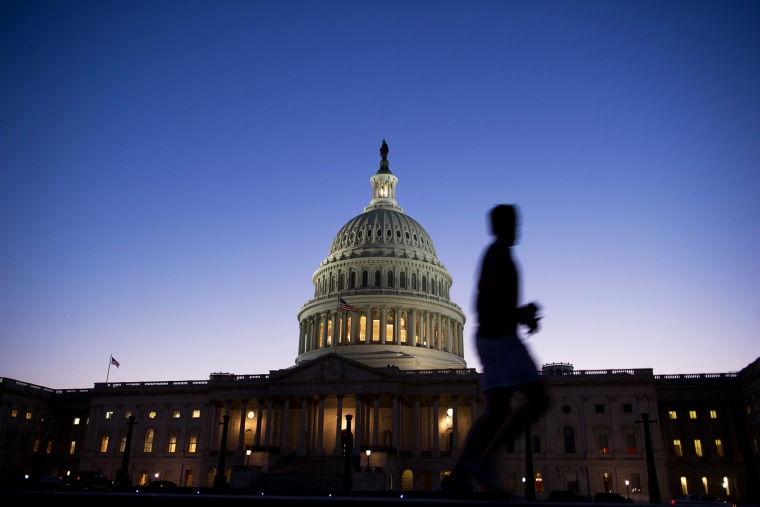A couple of weeks ago, House Speaker John Boehner (R-Ohio) tweeted the House Republicans' five-point jobs plan, which, regrettably, was
left entirely blank. It was obviously just a mix-up -- Boehner wasn't trying to embarrass his party on purpose -- but it underscored an important truth about the lack of ideas from GOP lawmakers on the nation's #1 issue.
Boehner and most congressional Republicans, of course, don't see it that way. Mention the word "jobs," and GOP lawmakers have an immediate and reflexive talking point: House Republicans passed "
more than 40 jobs bills" in this Congress, but those rascally Senate Democrats refused to pass them.
Reality tells a different story. Those who actually read the list of the "more than 40 jobs bills" notice that several of the measures
aren't related to job creation at all. What's more,
Jackie Calmes this week sought out economists, including plenty of conservative economists, for their impressions of the Republicans' agenda.
''Some of those things will help,'' Matthew J. Slaughter, an economics professor at Dartmouth College, said after reviewing nearly four dozen measures that House Republicans have labeled ''jobs bills.'' He cited some business tax cuts, for example, even as he cautioned about the cost of such actions. ''But,'' added Mr. Slaughter, who served on President George W. Bush's Council of Economic Advisers, ''it just struck me as sort of a compendium of modest expectations. If you ask me, 'What's your ballpark guess for how many jobs are going to be created?,' it's just not many.'' [...] While private sector analysts say that the varied Boehner list is not suitable to their computer models, Joel Prakken, a founder of the St. Louis-based Macroeconomic Advisers, said, ''I don't think you would get a rush of hiring from passing these bills.''
In 2011, President Obama presented Congress with a package called the American Jobs Act, which independent analysts said would have added about 150,000 jobs per month to the economy, every month for a year. Republicans refused to even a hold a vote on the president's proposal, despite public demand for policymakers to address the jobs crisis.
But the ensuing challenge from Democrats to GOP lawmakers was specific: if you don't like Obama's plan, present an alternative, allow independent analysts to scrutinize the preferred Republican approach, and provide an estimate of how many Americans jobs it would create.
Republicans never even tried to meet this challenge, and the reason why is pretty obvious: the GOP alternative, if it existed, would look pretty ridiculous when compared to the White House's plan. Republicans keep screaming "more than 40 jobs bills!" in the hopes that (a) no one will look too closely at the bills themselves; and (b) voters won't notice that the GOP jobs bills won't actually create jobs.
It'd be incredibly easy for Boehner and his allies to prove otherwise -- they could tell us exactly how many jobs their jobs package would produce. But that doesn't happen because it can't happen.
On the contrary, congressional Republicans have not only failed to produce a credible jobs plan, they've also taken a variety of steps intended to slow economic growth -- taking capital out of the economy through spending cuts, shutting down the government, and threatening default through a series of debt-ceiling hostage crises.
Calmes' report added that "most economists and business executives ... would be content if Republicans simply ''do no harm,'' as some put it, by avoiding self-imposed crises." In recent years, even this has been too much to ask.
The most revealing quotation in the Times article came from Kevin Smith, a spokesman for Boehner. When asked about the 46 bills that Boehner has outlined as the Republican jobs package -- most of which would cut regulations and taxes -- Smith said that the bills were not "a cure-all, but they would be a good start for our economy; we need to do more." In other words, after six years of critiquing Obama's economic policies, House Republicans still don't have an economic agenda to fix the economy's ills. In some sense, that's OK right now. The recovery has taken a step forward this year and we no longer need a big jobs package to save the economy (although more infrastructure spending would help). But during the beginning of the Obama presidency that wasn't the case. Then, we did need a big jobs plan, but Republicans offered the same supply-side ideas they're proposing now. Based on Smith's comments, it seems the GOP was aware of this too.
It's good thing for Republicans that voters aren't aware of any of this, or the GOP might be in real trouble.
